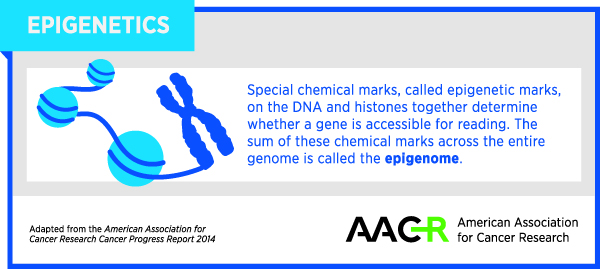Epigenetic Research Yields New Multiple Myeloma Therapeutic
Just days before the start of multiple myeloma awareness month, which began Sunday, March 1, the U.S. Food and Drug Administration (FDA) provided the multiple myeloma community with good news when it announced the approval of a new epigenetic-targeted therapeutic called panobinostat (Farydak) for treating certain patients with the disease: those whose multiple myeloma has relapsed despite prior treatment with at least two therapeutics, including bortezomib and an immunomodulatory agent.

Panobinostat is a member of a class of anticancer therapeutics called histone deacetylase (HDAC) inhibitors. It is the first HDAC inhibitor approved by the FDA for treating multiple myeloma. The other FDA-approved HDAC inhibitors—vorinostat (Zolinza), romidepsin (Istodax), and belinostat (Beleodaq)—are used to treat certain patients with various types of peripheral T-cell lymphoma, a rare form of non-Hodgkin lymphoma.
What Are Epigenetic-targeted Therapeutics?
HDAC inhibitors are a class of epigenetic-targeted therapeutics that, as their name implies, block the function of HDACs, which are one of several classes of enzymes that modify the epigenome of a cell.
Modifications to the epigenome of a cell change the pattern of genes expressed by the cell without changing the nucleotide sequence of the cell’s genes. Among the non-genetic (or epigenetic) elements that control which genes are expressed by which cell type, and when, are chemical tags called acetyl groups. The addition or removal of acetyl groups from histones alters chromatin structure and thereby gene accessibility.
Epigenetic modifications work in concert with genetic changes to influence cancer development, as eloquently explained in a recent video by William Nelson, MD, PhD, director of The Sidney Kimmel Comprehensive Cancer Center at Johns Hopkins and new editor-in-chief of Cancer Today. However, the exact molecular chain of events by which epigenetic-targeted therapeutics such as panobinostat, which prevents the removal of acetyl groups from histones, exert their anticancer effects is not yet clear, but it is likely to in part involve the reversal of some cancer-associated epigenome modifications.
https://www.youtube.com/watch?v=9UrL0PMIyiA
FDA Approves Panobinostat
The FDA approval of panobinostat, which is to be used in combination with bortezomib and dexamethasone, was based on results from the randomized, double-blind, phase III panobinostat oral in multiple myeloma-1 (PANORAMA-1) trial. Among the 193 patients in the trial who had received prior treatment with both bortezomib and an immunomodulatory agent, adding panobinostat to bortezomib and dexamethasone almost doubled the time to disease progression: progression-free survival was 10.6 months for those patients who received panobinostat versus 5.8 months for those who received placebo.
The restriction of the approval of the panobinostat, bortezomib, and dexamethasone combination to use for the treatment of patients with relapsed multiple myeloma who have already received at least two prior therapeutics, including bortezomib and an immunomodulatory agent, reflects concerns voiced by the FDA’s Oncologic Drugs Advisory Committee that the benefits of the drug combination, as assessed by progression-free survival, do not outweigh the risks—deaths and non-fatal serious adverse side effects—for patients who have not tried the other two treatment options.
Where Next?
Just days before the panobinostat approval, significant new advances in epigenetic research were reported in a series of 14 papers from investigators working together through the NIH Roadmap Epigenomics Mapping Consortium. The reported data go a long way toward the goal of the consortium, which is to produce a public resource of human epigenomic data to catalyze basic biology and disease-oriented research.
As noted in a recent post on this blog by Peter A. Jones, PhD, DSc, research director and chief scientific officer of the Van Andel Research Institute in Grand Rapids, Michigan, one team working to improve the health and enhance the lives of current and future generations of cancer patients through epigenetic research is the recently announced Van Andel Research Institute and Stand Up To Cancer Epigenetics Dream Team.
With so much basic, translational, and clinical research going on the field of epigenetic research, it is hoped that panobinostat will be joined by more FDA-approved epigenetic-targeted therapeutics in the near future.



